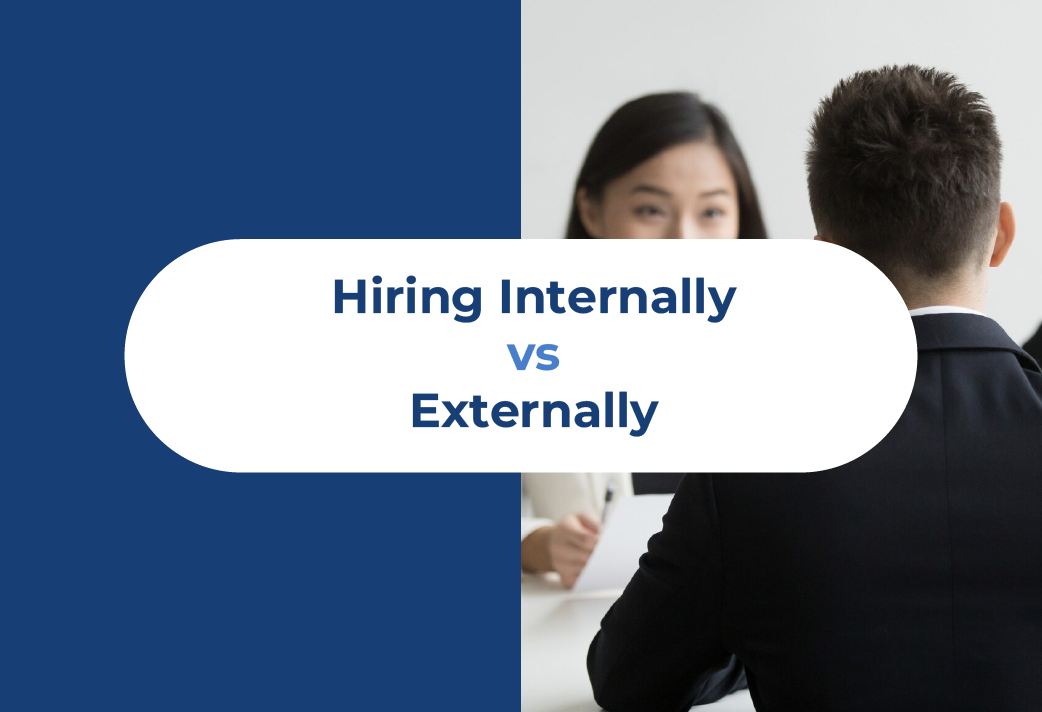Companies often find themselves at a crossroads when seeking to fill a vacancy: do they promote from within or look externally for new talent? Hiring internally vs hiring externally can significantly impact organizational culture, employee morale, and, ultimately, business success.
The trend of looking for upper-level employees through internal recruitment is on the rise. In 2023, up to 77% of all C-suite positions in publicly traded companies were done through internal promotion, up from 67% 5 years ago, according to some studies. As a result, it’s vital to know how each option can affect your team and future projects. The right choice can mean long-term stability and growth; the wrong one may cause chaos and delays for months or more.
Why Companies Hire Internally
Promoting from within offers several compelling advantages. Overall, it fosters a sense of loyalty and motivation among existing employees as they see opportunities for career advancement within the organization.
Internal hiring often requires less onboarding time and relies on those being promoted already being familiar with the company’s culture, processes, and expectations. This can lead to quicker integration into the new role without fear of current employees feeling they’re being left out.
What are the Advantages of Hiring Internally?
- One significant advantage of hiring internally is the ability to make the most of existing knowledge and skills. As current employees have already gone through a lot of in-house training, they’ll already be familiar with everything they need to succeed.
- Potential candidates have also already demonstrated their capabilities and potential, reducing the risk associated with hiring an unknown entity.
- Promoting from within can boost employee morale as it signals that hard work and dedication are recognized and rewarded.
- Internal hires typically require lower recruitment costs compared to external candidates. As there’s no need to invest in extensive advertising, nor is there a lengthy interview process, you can keep overheads low. However, that isn’t to say that internal hiring doesn’t require some form of hiring process which can’t be improved.
Overall, hiring internally is a cost-effective method that aims to make the most of available options. It can be especially appealing for smaller companies or those operating on tight budgets.
What are the Disadvantages of Internal Hiring?
Despite its benefits, internal hiring also has its limitations:
- One common concern is the potential for stagnation or the fact that you may miss out on fresh perspectives within your organization. By continually promoting from within, companies risk becoming insular, hindering the potential for future innovation and growth.
- Internal hires may bring baggage from their past roles or relationships, leading to conflicts or biases that could disrupt team dynamics.
- Additionally, if suitable internal candidates are lacking, promoting someone who isn’t fully qualified for the role could result in subpar performance, more time spent on training them to be fit for the task, and dissatisfaction among their peers.
Why Companies Hire Externally
When internal talent pools are insufficient or specific skills are needed, companies often turn to external hiring. Recruiting externally is also seen as a great, cost-effective way for companies to explore new options or markets.
Hiring internally may be seen as a way to make the most of familiar or available resources, but external candidates are often sought precisely because they inject new ideas, experiences, and perspectives into the organization, driving innovation and diversity.
What are the Advantages of Hiring Externally?
- One of the most significant advantages of external hiring is the potential for fresh perspectives and ideas. External candidates bring their skills and experiences from other organizations or industries, which can stimulate creativity and problem-solving within the team. This is especially useful if they are coming from competitors or adjacent sectors.
- External hires may possess skills or qualifications that are not currently present within the organization, filling crucial gaps and enhancing overall capabilities.
- Outside candidates bring with them new networks and connections, expanding the company’s reach and opportunities for collaboration.
Overall, this influx of external talent can invigorate existing teams and drive innovation, propelling the company forward in a competitive market. This option is seen as particularly advantageous for internally-minded companies.
What are the Disadvantages of External Hiring?
Despite its benefits, external hiring also presents challenges:
- One common concern is the potential for cultural conflict. External candidates may struggle to adapt to company values, norms, and practices that conflict with their past experiences. This disharmony may lead to conflicts or discord within a team.
- Integrating external hires may require more time and resources compared to internal candidates, as they need to be made more aware of processes or expectations.
- External hiring can be more expensive than promoting from within. Hiring bonuses, relocation expenses, and higher salary expectations for experienced candidates can quickly add up, putting more strain on a budget.
- Furthermore, there’s always uncertainty when hiring external candidates, as how well they fit into a structure may not be fully known until they’re already on board.
Conclusion – Making the Choice and How to Ensure You’re Hiring the Best
Ultimately, making the choice between hiring internally and externally depends on various factors. While internal hiring can promote loyalty and cost-effectiveness, external hiring offers fresh perspectives and specialized skills.
To ensure you’re providing the best chance for your team, it’s vital to conduct a thorough analysis of your current talent pool, future workforce needs, and the potential impact of each hiring decision.
Consider implementing structured interview processes, competency assessments, and cultural fit evaluations to identify the most suitable candidates, regardless of whether they come from within or outside the organization. Similarly, new technologies or ideas are always being created to help boost your hiring efficiency.
You can also consider taking on the advice or guidance of skilled hiring professionals to help improve your recruitment process and find the best talent available. This help can be vital, whether it’s to widen your potential talent pool when hiring externally or providing an impartial outside opinion on current employees when hiring internally.
By taking every resource into consideration and carefully weighing the advantages and disadvantages of hiring internally vs externally, you can make informed decisions that drive success and foster a thriving, dynamic workforce.
How INS Global Helps Make International Hiring Easier
INS Global excels in international hiring processes, whether hiring internally via promotions or through external talent acquisition. With a global presence spanning 160+ countries, INS Global provides networks and resources to support hiring or transfers worldwide, with localized expertise in every region.
Thanks to our tailored solutions, we cater to diverse workforce needs, whether you’re a startup expanding into new markets or an established multinational corporation building distributed teams across multiple countries.
To learn more about our suite of comprehensive services, contact our team of expert advisors today for a free consultation.


SHARE